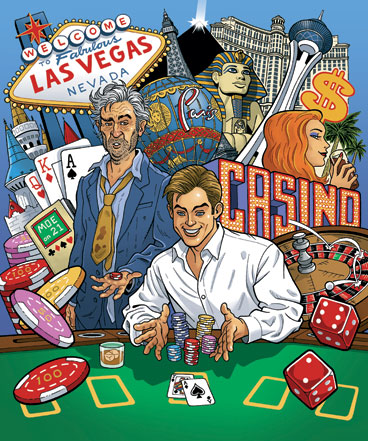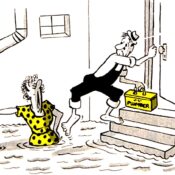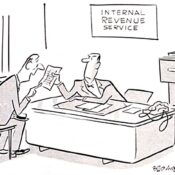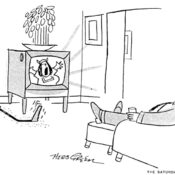I know Phil would never lie to me. He’s confided in me since he could talk, and told me secrets that all turned out to be true—our mothers were sisters, and they had the same relationship; they told each other everything.
So when my cousin Phil told me about his three days in Las Vegas, I believed him. It sounded like a movie, but it happened to him.
It starts like this: Phil is a junior executive at a big company in Chicago. One day his boss called him in and told him he was going to represent the company at a trade show in Las Vegas. Pretty exciting feather in his cap. He’s single, got a nice little apartment, and just bought a luxury car. He’s doing well—very well.
So, he packed his fine Italian suitcase, which he bought with bonus money his firm gave him, stuck $400 in his wallet, and took off to Sin City, deciding to drive and see a little of the country.
In Denver, he found a book called Beating the Games in Vegas. He stayed up most of the night reading it. As he got in his car in the morning, he decided that his game would be “21.”
He detoured to visit Provo, Utah. He liked the name—Provo—there was something about it that made him smile. While there, he found a book that appealed to him as much as the name Provo. It was simply titled Moe on 21. “The book,” the cover said, “will make you a winner at the table.” Phil memorized nearly every line in the book. He arrived in Vegas early in the morning, got some sleep, went to the trade show, checked in and shook some hands, then went to the casino. He got a hundred dollars worth of $5 chips, then strolled along the 21 tables, watching players and reconnecting each of their “moves” to what “Moe” had written. Most of them, he found, obviously did not know how to play the game.
Phil sat down at a table and put a $5 chip in the card box. He won immediately, doubling his bet. He then lost six hands in a row, picked up his remaining chips, and left the table. “Dealers can get hot,” Moe had written. “Never forget, it is gambling.”
Phil played some more and won back his losses. This went well into the night. By 3:00 a.m., he was ahead. Now he sat alone at a table, just Phil and the dealer. He was soon joined by a seedy, elderly man with a soiled tie at half mast, badly in need of a haircut and shave, with two $100 chips. He pushed them into play. His face card was a six. He asked for another card and turned over his hand. He had 26. He busted out.
Phil couldn’t resist giving this unfortunate man some advice. “The dealer had a five up,” he said. “You shouldn’t hit on 16.”
The man looked at him in disgust. “How do you know?”
“Here, in this book, Moe on 21, by Moe,” said Phil.
The man nodded. “I know,” he said. “I am Moe.” He got up and started to walk away, but then turned to Phil. “Sometimes,” he hesitated, “you gotta forget what the book says and just play a hunch.”
The next day, Phil went back to the trade show, but all he could think of was what Moe said after going against his own advice. Phil had reread Moe’s book, and there it was, in bold print: “DON’T,” the line read, “PLAY HUNCHES! 21 is a game you can win if you play it right.” But this, obviously, wasn’t true. Moe looked like he was done, broke, busted. Why was he now playing a “hunch?” Because it’s more exciting. That was what Phil decided.
That night, Phil went back to his room, got his stash, which had grown substantially the previous night, and went back to the casino. He stopped at a roulette table. “Provo,” he said to himself, “five letters.” He took his entire pocketful of $100 chips and put them on number five. The wheel went round, and the silver ball hopped and spun and landed on his number.
He now had more than $5,000. He walked to the 21 tables. He played only hunches, and by midnight, he’d won $96,000.
But things started to change. At 3:20 a.m., he counted his chips. He had just about $10,000 left. He’d lost. He was tired and hungry.
He scooped up his chips and turned to leave, then collided with someone and the chips flew to the floor. “I’m sorry,” a voice said. And there, helping him pick up his chips was the prettiest girl he’d ever seen. “Hi,” she said. “I’m Gladys and I’m clumsy.” She handed him the rest of the chips and he smiled at her.
“I’m starving,” he said. “Would you like something to eat?”
So, they ate and talked. She said she was in the carpet business in Oregon. No husband. No boyfriend. Just taking a couple of days off on her own. They walked up to his room, and she poured them a couple of Scotches from the mini-bar. … He woke up two days later with a terrible headache. His $10,000 in chips were gone, as were his credit cards, cash, and car keys.
Leaving the hotel that day, he walked through the casino, and there was Moe, clean-shaven and wearing an expensive suit, a pile of $100 chips in front of him. He saw Phil and smiled. “Sometimes you play hunches,” he said. “And sometimes you go by the book.”
Phil went back to the convention and borrowed money from a friend to get home. “I did great,” he told me. “I went to Vegas in a $60,000 Cadillac and went home in a $600,000 Greyhound bus.”
Phil told me that someday he was going to go back to Vegas, play it by the book, and maybe run into Gladys again.
But then he met Blanche, who works in human resources at his company, and they fell in love and decided to get married. He asked her where she’d like to go on their honeymoon. She’d already thought about it.
“I’d like to go somewhere,” she said, “where there are bright lights, great shows, and gambling.”
So they went to Atlantic City.
Become a Saturday Evening Post member and enjoy unlimited access. Subscribe now



